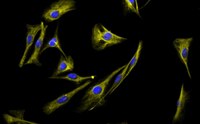SCC613 Sigma-AldrichLX-2 Cas9 Human Hepatic Stellate Cell Line
The LX-2 Cas9 human hepatic stellate cell line has been extensively characterized and retains key features of hepatic stellate cytokine signaling, neuronal gene expression, retinoid metabolism, and fibrogenesis , making it a highly suitable model of human hepatic fibrosis.
More>> The LX-2 Cas9 human hepatic stellate cell line has been extensively characterized and retains key features of hepatic stellate cytokine signaling, neuronal gene expression, retinoid metabolism, and fibrogenesis , making it a highly suitable model of human hepatic fibrosis. Less<<Recommended Products
Overview
| Replacement Information |
|---|
| References |
|---|
| Product Information | |
|---|---|
| Components |
|
| Quality Level | MQ100 |
| Biological Information | |
|---|---|
| Cell Line Type |
|
| Physicochemical Information |
|---|
| Dimensions |
|---|
| Materials Information |
|---|
| Toxicological Information |
|---|
| Safety Information according to GHS |
|---|
| Safety Information |
|---|
| Product Usage Statements | |
|---|---|
| Quality Assurance | • Each vial contains ≥ 1X106 viable cells. • Cells are tested negative for infectious diseases by a Human Essential CLEAR Panel by Charles River Animal Diagnostic Services. • Cells are verified to be of human origin and negative for interspecies contamination from mouse, rat, Chinese hamster, Golden Syrian hamster, and nonhuman primate (NHP) as assessed by a Contamination Clear panel by Charles River Animal Diagnostic Services • Cells are negative for mycoplasma contamination. |
| Usage Statement |
|
| Packaging Information | |
|---|---|
| Material Size | ≥1X10⁶ cells/vial |
| Transport Information |
|---|
| Supplemental Information |
|---|
| Specifications |
|---|
| Global Trade Item Number | |
|---|---|
| Catalogue Number | GTIN |
| SCC613 | 04065268102060 |
Documentation
LX-2 Cas9 Human Hepatic Stellate Cell Line SDS
| Title |
|---|
Data Sheet
| Title |
|---|
| Data Sheet-SCC613 |










